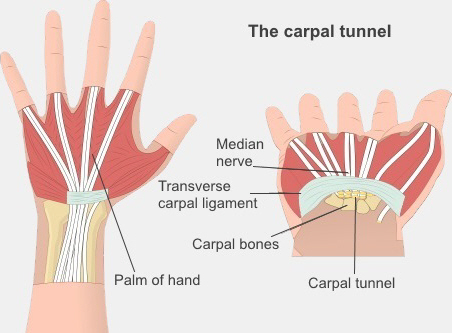Carpal tunnel syndrome
What the carpal tunnel is
The carpal tunnel is a narrow passage in your wrist that your median nerve and the tendons to your thumb and fingers pass though. Carpal tunnel syndrome is caused by pressure on the median nerve.

Diagram showing the nerves running through the carpal tunnel into the hand.
Causes of carpal tunnel syndrome
Anything that causes swelling in the carpal tunnel can cause carpal tunnel syndrome. We do not always know why this swelling happens, but some conditions are linked to carpal tunnel syndrome. These include:
- pregnancy
- being overweight
- fluid retention
- diabetes
- hypothyroidism
- rheumatoid arthritis and connective tissue diseases
- wrist wounds or broken bones.
Carpal tunnel syndrome can also happen after hard or repetitive movements of your wrist or hand. ACC may cover carpal tunnel syndrome if it has been caused by work tasks.
Symptoms of carpal tunnel syndrome
Symptoms of carpal tunnel include:
- tingling, burning or numbness in the thumb and fingers
- pain in your wrist or fingers that sometimes moves up to your elbow
- weakness or difficulty with picking up or gripping things.
Your symptoms may be particularly bad at night, or when doing the same task for a long time, like long-distance driving.
Diagnosing carpal tunnel syndrome
Your healthcare provider will ask you about your symptoms.
They may also suggest you have a nerve conduction study if they are not sure you have carpal tunnel syndrome. This study tests to see how well and how quickly your nerves conduct electrical signals.
Treating carpal tunnel syndrome
There are several treatments for carpal tunnel syndrome, depending on how severe your symptoms are.
- Talk to your healthcare provider about treating any conditions that could be causing or making it worse.
- Avoid or reduce repetitive hand and wrist activities that may make it worse.
- Wrist splints can help stop or reduce pain or numbness especially at night, by preventing the median nerve from being squeezed.
- Steroid injections can ease the pain and symptoms of carpal tunnel syndrome.
Surgery for carpal tunnel syndrome
Your healthcare provider may refer you for surgery if your symptoms have not improved after other treatments, or your symptoms are very bad.
Carpal tunnel release (or decompression) surgery aims to make more space in the carpel tunnel to take the pressure off your median nerve. It is generally very effective. If there are signs your nerve is damaged, then surgery aims to stop it getting worse. It may not be able to completely reverse any existing damage. Some symptoms can get better immediately after the operation, but numbness can take longer to improve.